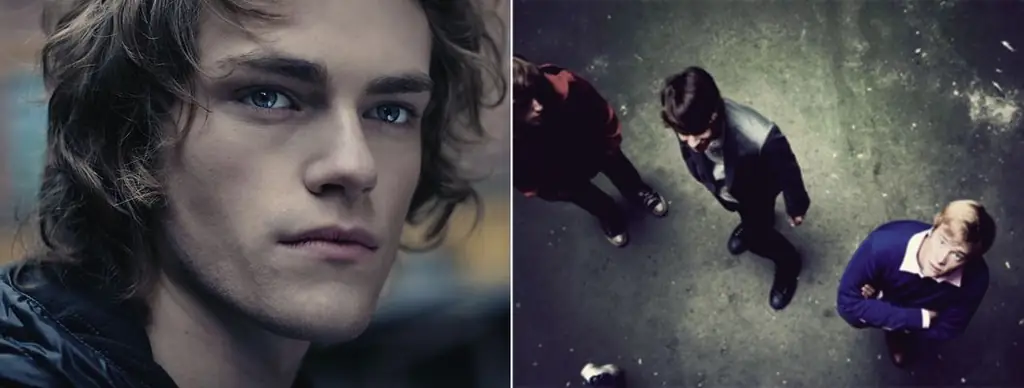- Author Adrian Jeff jeff@psychologosportal.com.
- Public 2023-12-17 05:06.
- Last modified 2025-01-24 14:09.

Stop parent! Do not enter my life without knocking
Yesterday you were sure that your son is not threatened with becoming a gambling addict, he is serious and focused only on science. Already today you can see that the son has “withdrawn into himself” and plays computer games all night long. The child needs you less and less, it becomes more difficult to control his behavior. Fear arises, because of which you begin to put pressure, and this causes even more alienation between you …
Your little child has grown up to be 14, 15 or 16 years old. Now you can't enter his room without knocking. When he doesn't like what you say, he can boldly express his opinion, and these are often harsh and unexpected words. It shocks you, offends you. He never allowed himself that! And now more and more rebellious behavior is manifested in a son or daughter, strange things are done.
Yesterday an affectionate daughter was snuggling up to you, and you talked with her in confidence. She is an excellent student, she spent whole days at the lessons. Already today, my daughter preferred a multi-day trip with her classmates to rest with her family. And with you it happens less and less. She has literally changed before her eyes and thinks less and less about her studies.
Yesterday you were sure that your son is not threatened with becoming a gambling addict, he is serious and focused only on science. Already today you can see that the son has “withdrawn into himself” and plays computer games all night long.
The child needs you less and less, it becomes more difficult to control his behavior. Fear arises, because of which you begin to put pressure, and this creates even more alienation between you.
Let's consider from the point of view of System-Vector Psychology Yuri Burlan, how to find and not lose contact with a child at this age. How to behave with him.
This scary word "puberty"
To preserve himself and develop his natural properties, a child needs a sense of security and safety. And, as a rule, his mother guarantees him this.
As Yuri Burlan's system-vector psychology explains, it is certainly necessary for a child to receive a sense of security and safety from a mother until the age of six. Further, the need for this gradually decreases - up to 15-16 years. The child gradually gives up the need to receive protection from the mother.
Children, breaking away from their mother, prepare for adulthood. Boys acquire a desire to preserve themselves on their own. To do this, they self-organize into a single system of security and safety, in which they are ranked, distributed according to roles in society. This is how boys try themselves for the first time in accordance with their abilities and qualities.
At the age of 14-16, the girl begins to show herself in the role of a woman - she has a desire to find a man. So she tests her feminine attractiveness on boys, on whom her security and safety will depend in the future.
How to communicate with an adult child?
The difficulties of this period are associated with the fact that the child does not yet have special skills of independence and maturity. And he is already trying to use his properties in society, begins to take responsibility for his life on himself. But he does it clumsily, in an exaggerated, and sometimes in an aggressive manner. Therefore, his actions may seem strange, and his behavior incomprehensible. It is during this period of time that discord occurs most often in relations between parents and children.
Any parental resistance to these tests of their strength is just an unsuccessful attempt to return the child to the previous position, when the parents understood their child, that is, back to childhood, which irrevocably leaves. There is a spring effect - the harder you compress it, the faster and sharper it returns to its original position. This mechanism is triggered by nature, and we cannot cancel it. By our actions, we can only cause negative feelings in growing up children.
However, grown-up children still need competent and creative direction from an adult. And in order to understand how to do this, we need to understand the characteristics of the child.
He needs a special approach
The volume of development of natural properties that the child absorbed until the age of 15-16, everything that has developed in a teenager by this age, is now beginning to be tested and used by him as at a dress rehearsal before adulthood. The manifestation of different poles of his natural qualities allows him to express himself in the entire range of his properties, to feel the reaction of the environment to actions and to choose an adult scenario for his life.
All children are different, and especially clearly the natural qualities of a person, in accordance with his vectors, begin to manifest themselves in adolescence.
There are eight vectors in total. There are the lower vectors that determine our libido, and the upper ones, which regulate the intellectual and cognitive sphere of a person. So, among the lower vectors, there are anal and cutaneous vectors.

Modern Romeo and Juliet
The characteristic qualities of the skin vector are logical thinking, innate properties for the development of discipline. These are the owners of a flexible psyche, they are mobile, they like to do everything quickly, and several things at the same time. At the same time, they are prone to self-restraint, save time and space.
So, a child with a skin vector in puberty can experiment on the full breadth of the qualities of this vector: from lack of self-control and systematic delays to scrupulous execution of the established order. If he always came home at the same time, which was set by his parents, then at the age of 15 he can come home at 12 at night. In addition, he will not answer questions about where he was. Or he will answer at all that this is not a matter of the parental mind.
The sides of the anal vector in a child, pleasant for parents, are obedience, complaisance, and diligence. In addition, such a child has an analytical mindset, prefers to do all things slowly, consistently and efficiently. In puberty, a child with an anal vector can temporarily turn into his opposite - be rude to his parents, criticize them.
Consider from the point of view of the system-vector psychology of Yuri Burlan also the features of the manifestation of the upper vectors. The visual vector for the teenage girl and the sound vector for the boy.
Juliet
My love is not looking for vain words -
It has already grown immensely.
W. Shakespeare (Romeo and Juliet)
Falling in love for a girl in this period is a natural natural striving. However, there are girls and boys whose first love can be especially fervent. A kind, open, sweet girl cannot be recognized. Now she is spinning near the mirror, then she cries, hugging her teddy bear, then excitedly writes messages on the phone …
A special emotionality with a wide range of manifestations of feelings and emotions is set by the visual vector. Spectators can fly with love and sparkle with joy, or they can go into hysterics in a matter of seconds because of the slightest trouble. These are lovers of culture, art, connoisseurs of beauty. They have a well-developed imagination, they are dreamy and romantic, sensual and vulnerable. And, of course, they are amorous.
According to Yuri Burlan's system-vector psychology, the main role of spectators in our society is the creation of emotional connections between people.
All thoughts and actions of a girl in love are directed towards the boy. Only one desire dominates and determines her actions - to love and be loved. During this period of time, the girl can get carried away with diets, experiments in makeup, bright, defiant clothes.
Young Juliet's mood can change dramatically. She can be sad, and in a minute already laugh. Love for her is the meaning of life, the strongest feeling, the one and only. “This is the first and last time in her life,” the girl thinks, for the first time feeling deep sympathy for the boy.
Adults may think the daughter's feelings are far-fetched and frivolous, and, due to the parents' rejection of the behavior of a little lover, quarrels and conflicts are not excluded. As sad as it is for parents, love for the boy is most important during this period. And, as we have already discussed, this is a natural process that is embedded in the mental nature of a person.
The participation of adults here is possible only to the extent that the daughter allows. And here, knowing all the nuances of the visual vector, you can contribute to the manifestation of its best qualities. To establish contact with the daughter, you can participate in her interests. For example, go together for a consultation with a makeup artist or stylist. And after that, it may be possible to go to a joint viewing of a melodrama or to a master class with a creative bias. This will help strengthen the connection and fulfill the girl's emotional need.
Romeo
I need such a substance, That in a moment it would give complete rest
From life and with the same speed
Release the body from breathing …
V. Shakespeare ("Romeo and Juliet")
Since childhood, this boy read science fiction, asked stunning questions about life and death, about the Universe and God. Everyone was surprised at him: “What a serious, intelligent boy. Probably will be a scientist!"
Now he has grown up. You notice that he has become more withdrawn, absorbed in himself. Does not take off the headphones either day or night. And sometimes games and the Internet take over him deep into the night so that the child hardly gets out of bed in the morning to go to school.
Your boy is the owner of a powerful, abstract intellect, he has the potential for brilliant intellectual abilities. By the definition of the system-vector psychology of Yuri Burlan, these qualities are inherent in the sound vector. The sound scientist is naturally assigned the ability for music, exact sciences, philosophy, foreign languages.
He is constantly immersed in himself, in his thoughts. Whether he wanders the Internet, “lives” in a new game or tries intoxicating means - he does all this with one goal that he often cannot verbalize: to find the meaning of life, to answer the questions “Who am I? Where did you come from and where am I going? Questions constantly arise in his head, to which he does not find an answer.
In adolescence, at the time of maturation, problems of adaptation among peers come to the fore. The sonic child is overtaken by the same desires as all other boys - he is also led by nature. He will prove to the girls his worth and determine his place in society.

Only now the sound engineer is often not socialized. The natural desire for loneliness and silence makes it difficult for him to communicate in a team. Therefore, he may not be able to naturally integrate into the maturing community. He begins to look for another area where he knows how to better express himself, where it is easier and more familiar to him.
A teenage sound engineer begins to get involved in computer games with his own kind, goes to a rock concert, tries drugs … He tries to realize his natural desires in this way. However, it does not find any sense in this. Against this background, a teenager can increasingly seem aloof, absent.
The states of the sound vector can be different: from depression to complete happiness from feeling the meaning of life, revealing oneself, one's destiny and spiritual connections with other people. Sound depression occurs when a teenager cannot cope with the eternal search for answers to the questions of the universe.
As the system-vector psychology of Yuri Burlan says, the most comfortable state of the sound engineer is the silence of the night, so that no one distracts from focusing on himself. Depending on the condition, another option is also possible - hard rock, deafening music. This strain on the ears is a way to briefly reduce the pain of suffering in your relentless philosophical quest.
Gambling addiction, drugs, heavy music - all this can cause a short-term illusion of the fullness of life with meaning in a sound adolescent. Therefore, a careful attitude to the manifestations of its sound vector will help create a comfortable environment for establishing contact. It is important not to allow a rude intrusion into his space, to give him the opportunity to be alone. Observe silence, patiently wait for his answer to your question.
An interesting joint activity with parents for a sonic child can be, for example, going to a rock concert. And you can fulfill his old dream and, even if this request was once upon a time in his childhood you did not hear, buy him a musical instrument and find a teacher to practice music. This will show him that you understand him. And this will help him better fit into the company of his peers.
Montagues and Capulets these days. Parental involvement in the life of a teenager
Restrain sorrowful exclamations, Until these mysteries are clarified.
W. Shakespeare "Romeo and Juliet"
For growing children, growing up is a difficult period. The task of adults is to be patiently there and lend a helping hand at the right time.
To take a real part in the life of a teenager and help him, you need to earn his trust. Trusting relationships with children are built throughout their childhood. But even if contact is lost at some point, it can be resumed.
When we, parents, learn the mental characteristics of the child, tune in to his needs, it no longer occurs to us to reject his nature. As soon as contact with the child is found, parental involvement and assistance will be accepted by him.
If you want to learn more about the features of the manifestation of vectors in adolescence, come to the free online training on systemic vector psychology by Yuri Burlan. Register by the link:






